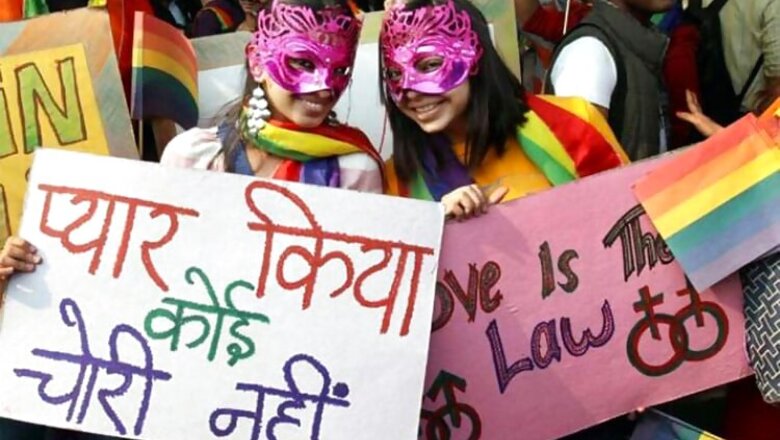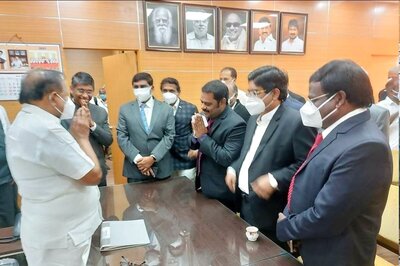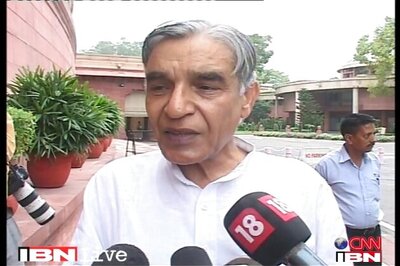
views
New Delhi: The Supreme Court will on Tuesday take a final call on the validity of controversial section 377 of the Indian Penal Code (IPC) with the entire Lesbian, Gay, Bi-sexual and Transgender (LGBT) community anxiously looking forward towards the apex court order. Section 377 criminalises consensual sexual acts of Lesbian, Gay, Bi-sexual and Transgender (LGBT) adults in private.
Critics say section 377 amounts to denial of their rights to privacy and dignity and results in gross miscarriage of justice. A bench of the three senior-most judges — Chief Justice of India TS Thakur, Justices Anil R Dave and JS Khehar — will hear a batch of eight curative petitions filed by parents, civil society, scientific and LGBT rights organizations against a January 28, 2014 judgment by the Supreme Court dismissing their review petitions on the ground that Section 377 is constitutional and applies to sexual acts irrespective of age or consent of the parties.
The Review Bench in January 2014 had agreed with its original appeal judgment on December 11, 2013, setting aside the internationally hailed judgement of the Delhi High Court. The High Court had declared Section 377 unconstitutional, and said it was in violation of the fundamental rights enshrined in Articles 14, 15 and 21 of the Constitution.
The High Court bench, led by its then Chief Justice AP Shah, had read down Section 377 to apply only to non-consensual, penile, non-vaginal sex, and sexual acts by adults with minors. On December 12, 2013, the SC bench of Justices Singhvi and SJ Mukhopadhaya reversed the Delhi HC's 2009 verdict and held that the 150-year-old Section 377, criminalizing gay sex, "does not suffer from the vice of unconstitutionality". The judgment would turn the clock back, and was being viewed in India and globally as a retrograde step. The possibility of police harassment of homosexuals could no longer be ruled out.
According to reports, the bench said: "In the light of plain meaning and legislative history of the section, we hold that Section 377 IPC would apply irrespective of age and consent." It added that the section does not discriminate any group with a particular sexual preference, a stand that was diametrically opposite to that by the Delhi HC.
"It is relevant to mention here that Section 377 IPC does not criminalize a particular people or identity or orientation. It merely identifies certain acts, which if committed, would constitute an offence. Such prohibition regulates sexual conduct regardless of gender identity and orientation," Justices Singhvi said.
The hearing on Tuesday is a rare remedy afforded to the petitioners, who have waged an almost two-year battle since the filing of their curative petitions in March 2014 for an open-court hearing. They have contended that the review judgment, if not corrected, may result in “immense public injury”.
The petitions argue that the Supreme Court, in the past two verdicts, had reached no clear consensus on the very purpose of continuing with the colonial-era Section 377. They argue that the court committed a “patent error of law” in concluding that there have been only 200 prosecutions in over 150 years under Section 377. “In so doing, the impugned judgement [January 2014] introduces a numerical requirement for the protections of Chapter III (Fundamental Rights) of the Constitution, whereas it is long settled that fundamental rights of miniscule minorities, even minorities of one, are entitled to full protection,” they contend.
They further contend that the Supreme Court went wrong in concluding that Section 377 only identifies certain acts as offences and does not criminalise LGBT people themselves. “By penalising the only form of sexual intercourse available to LGBT persons — that is, non-peno vaginal — Section 377 entirely denies sexual intercourse to the class of LGBT persons,” the petitioners contend. They argue that the restrain shown by Parliament in not discussing Section 377 during the debates on rape law in the Criminal Law (Amendment) Act, 2013, was misconstrued by the court as a legislative “endorsement of the unconstitutional provision.”
Sexual orientation covers sexual desires, feelings, practices and identification. Sexual orientation can be towards people of the same or different sexes (same-sex, heterosexual or bisexual orientation). Gender identity refers to the complex relationship between sex and gender, referring to a person's experience of self expression in relation to social categories of masculinity or femininity (gender). A person's subjectively felt gender identity may be at variance with their sex or physiological characteristics.
Although the Universal Declaration of Human Rights does not explicitly mention sexual orientation or gender identity, evolving conceptions of international human rights law include a broad interpretation to include the rights and the protection of the rights of LGBT people around the world.
People detained or imprisoned solely because of their homosexuality - including those individuals prosecuted for having sex in circumstances which would not be criminal for heterosexuals, or for their gender identity - are considered to be prisoners of conscience.
Human rights group Amnesty International calls for the decriminalization of homosexuality where such legislation remains, including a review of all legislation which could result in the discrimination, prosecution and punishment of people solely for their sexual orientation or gender identity.
The Yogyakarta Principles on the Application of International Human Rights Law in Relation to Sexual Orientation and Gender Identity, developed in 2006 by a group of LGBT experts in Yogyarkarta, Indonesia in response to well-known examples of abuse, provides a universal guide to applying international human rights law to violations experienced by lesbians, gay men, bisexual and transgender people to ensure the universal reach of human rights protections.
Violations: Execution by the state, Denial of employment, housing or health services, Loss of custody of children, Denial of asylum, Rape and otherwise torture in detention, Threats for campaigning for LGBT human rights, Regular subjection to verbal abuse
The United Nations has been working with member states to reject discrimination and criminalisation based on homophobia and transphobia. While the denial of human rights for LGBT persons persists throughout the world today, over 30 countries have decriminalized homosexuality in the past 20 years. In the face of resistance, determined efforts from the UN, associated NGOs, and representatives of Member States to guarantee the human rights of LGBT persons have been gaining momentum.


















Comments
0 comment